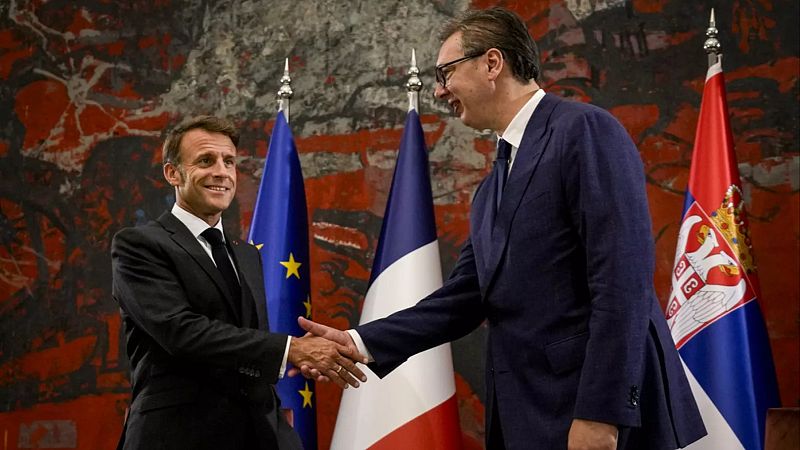
French President Emmanuel Macron met his Serbian counterpart Aleksandar Vučić in Paris on Wednesday for a discreet working lunch, at a time when Vučić is facing mounting political pressure at home.
The Élysée initially offered no official communication about the meeting, including which topics were discussed.
But hours later, Macron took to social media platform X to share key takeaways from their "long exchange".
“I first reiterated the importance that France attaches to the democratic and European destiny of Serbia,” Macron posted.
He expressed confidence in Serbia’s ability to “return to the path of dialogue,” and called on the future government to pursue “the expected reforms” and build on the country's recent economic progress.
The visit comes amid massive student protests in Serbia, sparked by the train station awning collapse in the city of Novi Sad in November, in which 16 people died. Demonstrators have accused the authorities and companies involved of corruption during the station's recent renovation.
Meanwhile, a group of around 100 Serbian students is cycling to the European Parliament in Strasbourg. They are expected to arrive next week, aiming to raise awareness with the EU authorities about the ongoing demonstrations in their country.
Many Serbian students feel they haven’t received enough support from the European Union, despite garnering significant backing at home.
Big economic interests for France
Despite the political turbulence, France has big economic interests in Serbia.
Last summer, Belgrade purchased 12 French Rafale fighter jets for the modest sum of €3 billion.
Vučić confirmed to reporters on Wednesday that Serbia will pay its second instalment of more than €400 million on Thursday.
Macron’s statement on social media also confirmed France's participation in the 2027 Expo in Belgrade, a clear show of support for Vučić.
France is also involved in broader infrastructure and energy projects in Serbia. The French company Vinci operates Belgrade’s airport, and Michelin manufactures tyres in the country.
Another key issue that was on the table on Wednesday was US President Donald Trump's tariffs.
Serbia has been hit the hardest in the region with 34% tariffs — higher than the 20% imposed on the EU — creating pressure on French stakeholders.
Regional stability on the table
Macron stated that the two leaders discussed the ongoing political crisis in Serbia's neighbour Bosnia, stressing France’s “unwavering support for the unity of this country” and condemning any action that would threaten its constitutional order.
Tensions there have soared following last month’s conviction of Bosnian Serb leader Milorad Dodik, a close political ally of Vučić.
Dodik was sentenced to one year in prison and banned from holding public office for six years by the State Court for refusing to accept the decisions of the High Representative, the international community's envoy overseeing the peace agreement in the Western Balkan country. Dodik can appeal the ruling.
The French leader also reiterated France’s commitment to the normalisation of relations between Serbia and Kosovo — calling it “an essential condition” for both countries’ EU aspirations.
Belgrade doesn’t recognise the sovereignty of Pristina, which declared independence in 2008. Numerous Brussels-led attempts at dialogue between the two sides have failed in recent years.







